 Technology peripherals
Technology peripherals
 AI
AI
 This wheel-legged robot from Harbin Institute of Technology has released version 3.0! Demystifying its design, controls and performance testing
This wheel-legged robot from Harbin Institute of Technology has released version 3.0! Demystifying its design, controls and performance testing
This wheel-legged robot from Harbin Institute of Technology has released version 3.0! Demystifying its design, controls and performance testing
DARPA (U.S. Defense Advanced Research Projects Agency) Robot Challenge (DRC) Held every two years and sponsored by the U.S. Department of Defense, the competition hopes to select robots that can perform tasks that humans cannot do at the Fukushima nuclear power plant. A robot that is responsible for on-site first aid when approaching hazards.
In the 2015 DRC DARPA Robot Challenge, the robot DRC-HUBO from South Korea relied on its "unique skills" to defeat 22 other top robots from 5 countries and won the championship. Among them There were many star robots such as Atlas and Japan's HRP developed by Boston Dynamics at that time.
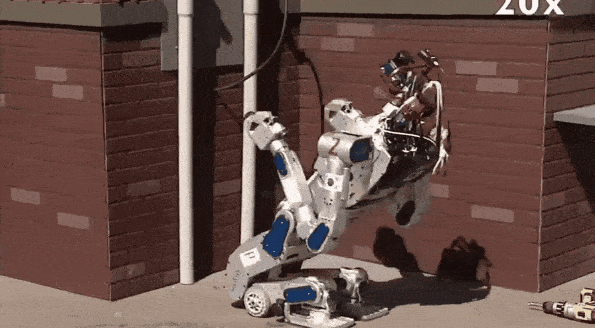
DRC-HUBO is a robot that can both stand and kneel
In the field of robotics, walking balance has always been an insurmountable gap. This is also the key to HUBO's final victory-The wheels installed on its knees and ankles allow the robot to switch from walking mode to wheeled movement. The "KAIST" team that developed it also won a $2 million grand prize at the time.
Exploration and rescue in dangerous environments are important applications of robot leg motion. Robots used for disaster rescue or field exploration are often required to have the ability to move quickly on flat roads and adapt to complex terrain. Based on this problem, a team from the State Key Laboratory of Robotics and Systems, School of Mechanical and Electrical Engineering, Harbin Institute of Technology, developed a highly maneuverable and highly adaptable hydraulically powered autonomous wheel-legged robot system - the WLR-3P robot. This robot can move quickly and efficiently on flat roads, and has excellent adaptability in rugged terrain environments.
This research was published under the title of the paper (Design and Control for WLR-3P: A Hydraulic Wheel-Legged Robot) in Cyborg and Bionic Systems, a new issue of the China Science and Technology Journal Excellence Action Plan High Starting Point.
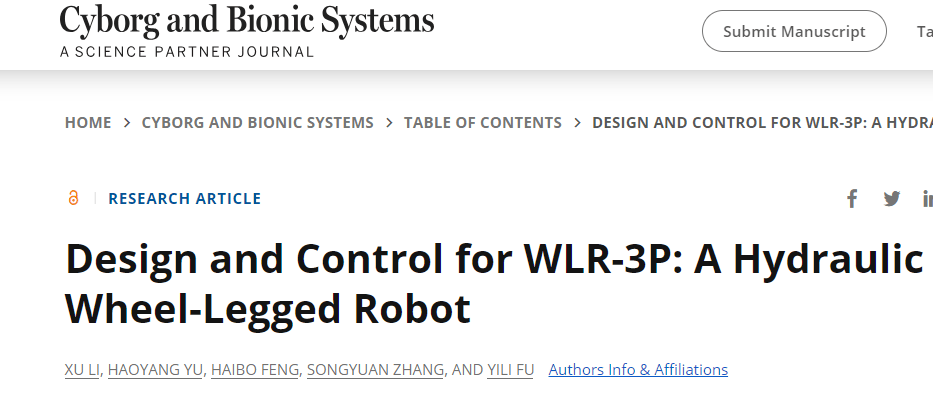
▍Unveil the mystery of WLR-3P robot
Let’s first take a look at what WLR-3P looks like:
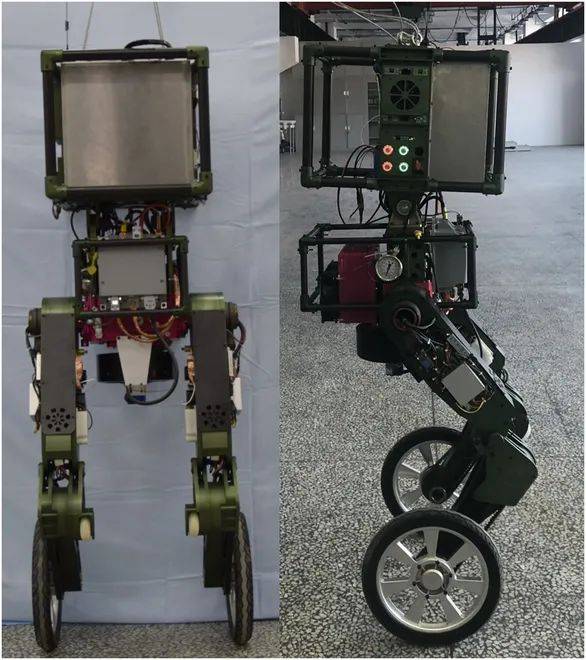
new type of hoseless hydraulic wheel-legged robot, WLR-3P is capable of jumping and moving quickly with autonomous power.
So how do researchers improve themaneuverability and environmental adaptability of robots? Mainly relies on these three points: (a) high power density and fast response drive, (b) light weight, large inertia and high strength, (c) reliable hydraulic system.
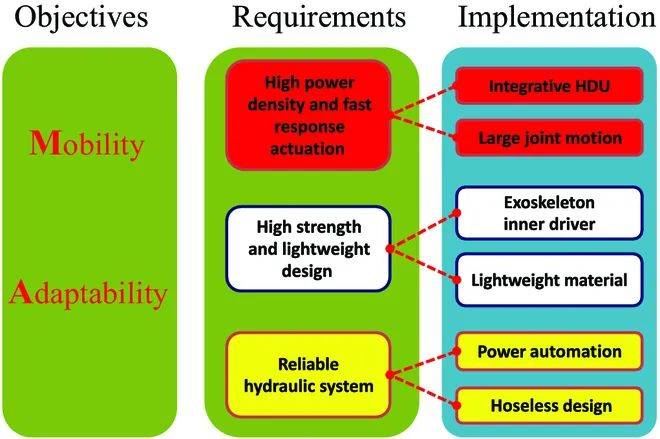
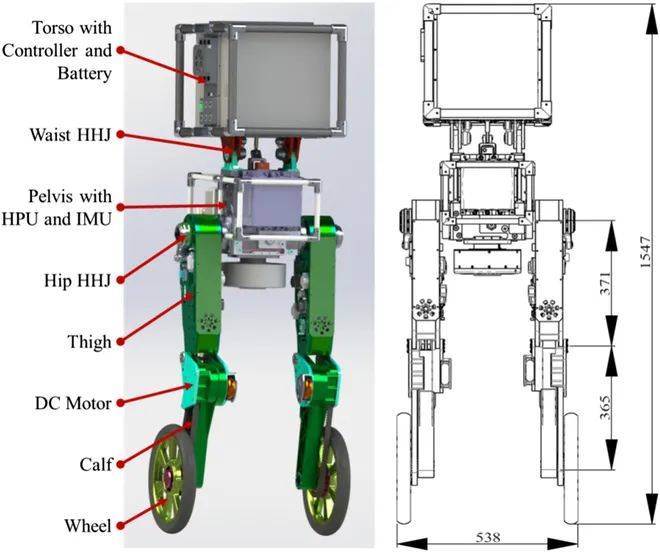
As shown above, the WLR-3P has 7 degrees of freedom (DOF): 3 DOF for each leg and 1 DOF at the waist. The three degrees of freedom of the leg are respectively on the hip joint, knee joint and driving wheel. The hip joint and knee joint are driven by HDU, and the driving wheel is driven by DC motor.
HDU includes customized high frequency response (20Hz) servo cylinder, high performance servo valve, displacement sensor and force sensor. The WLR-3P weighs 80 kg and comes with an onboard HPU and battery. The maximum height is 1.55 meters and the distance between the two wheels is approximately 0.54 meters. In addition, for safety reasons, the robot also "carries" a 1.8 kg carbon fiber hybrid aluminum alloy frame
As for why choose hydraulic? To put it simply and crudely,
robots using integrated hydraulic drive devices have high power density and fast drive response.
▍Advanced design and control strategy of WLR-3P
Researchers took into account the following factors: (a) high power-to-weight ratio, (b) excellent impact resistance, (c) high-frequency response for force/position control, and (d) biological properties comparable to humans .
The maximum power density of the knee joint hydraulic drive unit (HDU) in WLR-3P can reach about 7kW/kg, which is much higher than traditional motors. Rewritten content: The maximum power density of the knee hydraulic drive unit (HDU) in the WLR-3P is approximately 7 kW/kg, far exceeding that of conventional motors
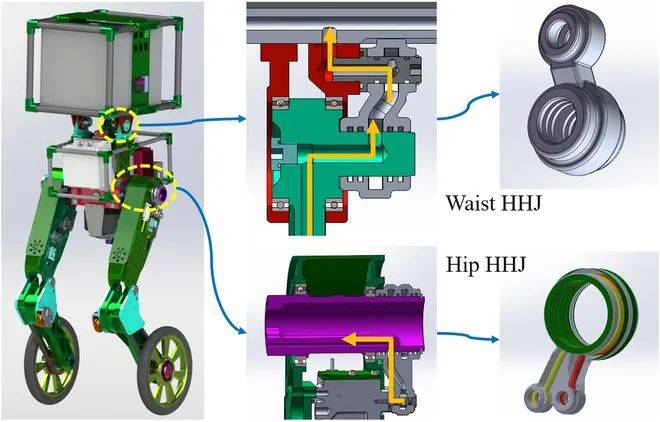
WLR-3P’s hips and waist HHJ
The miniaturization and integration of hydraulic power units (HPU) are the main difficulties in the field of hydraulic robot research, mainly due to the miniaturization of pumps and engines and system heating. Because WLR-3P does not have a large HPU installation space. R&D personnel have proposed an innovative design idea to achieve miniaturization and integration of HPU.
First, the gear pump is driven by a custom-made external rotor motor through a micro-coupling. High-pressure oil from the pump passes through a micro accumulator and filter to provide the hydraulic power required by the system. Secondly, in order to solve the heating problem of the system, a multi-functional fuel tank integrating heat dissipation, filtration and voltage stabilization was designed. Finally HPU can output hydraulic power with a maximum pressure of 21 MPa and a flow rate of 20 l/min.
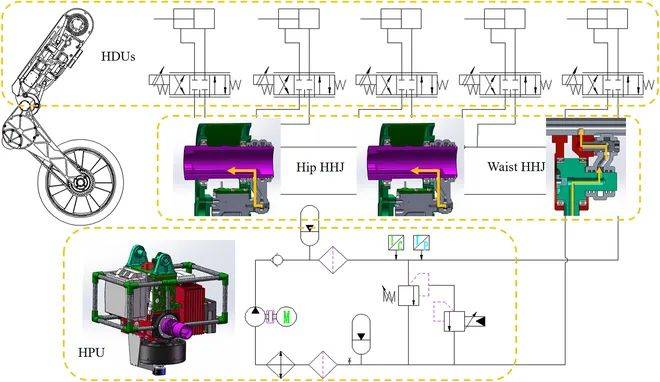
The hydraulic schematic diagram of the hydraulic system needs to be complete
The following figure shows the structure and composition of the HPU. The miniaturization and integration of HPU free the robot from the limitations of rubber hoses, making the robot's movement more "silky".
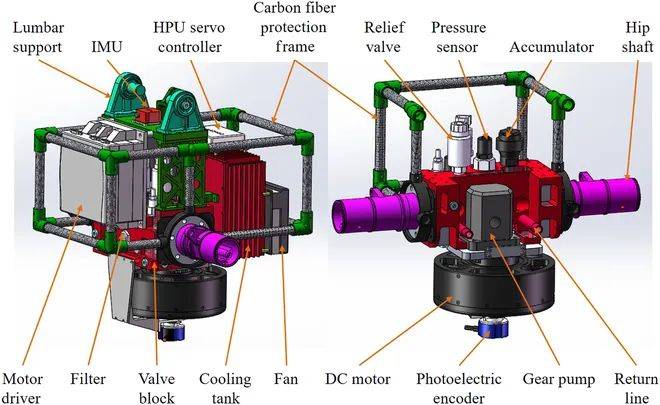
The structure and composition of HPU is also the pelvis of WLR-3P
In addition, the R&D team also proposed a control system including a hierarchical distributed electrical system and control strategy:
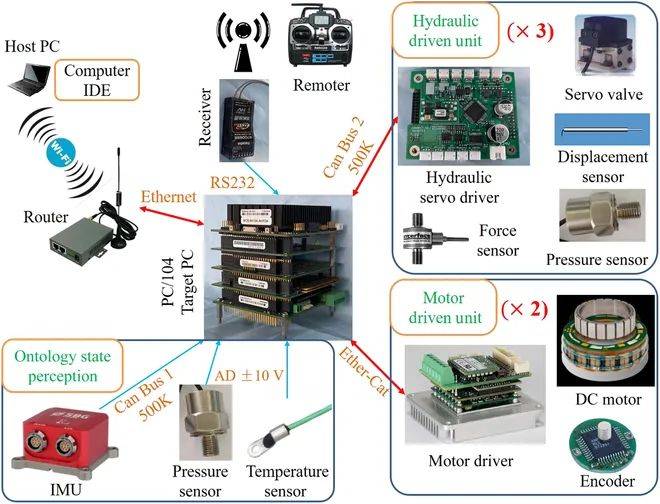
The content that needs to be rewritten is: WLR-3P’s electronic system
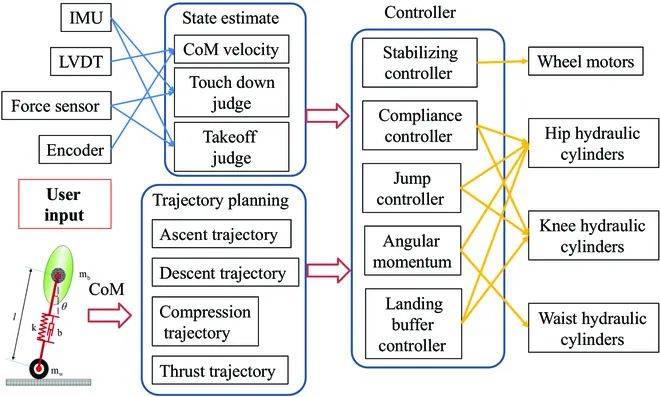
WLR-3P control framework
The content that needs to be rewritten is: ▍Balance and explosive power testing of WLR-3P
The researchers conducted tests around balanced performance and explosive power. Quick movement and squatting are the most basic actions to verify the balance performance of the wheel-legged robot. When moving quickly, the robot's center of mass (COM) changes rapidly in the horizontal direction, while when squatting, the COM changes rapidly in the vertical direction.
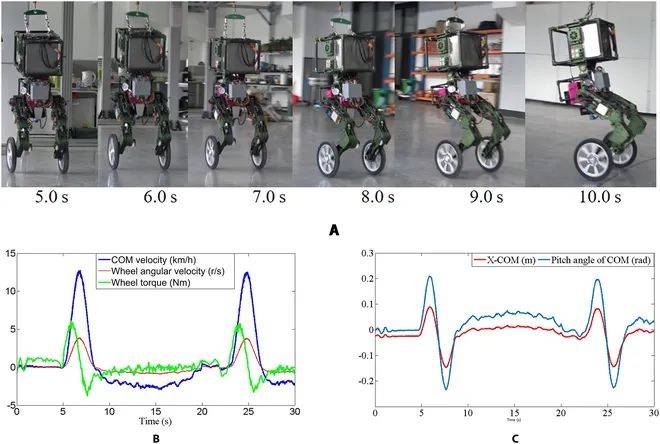
Quick Mobile Test

COM Squat snapshots in the height range of 0.35 and 0.65 m
The test shows that the horizontal and vertical balance capabilities of WLR-3P are OK, which also verifies the reliability of the robot hardware system.

WLR-3P can complete takeoff, flight and landing processes in 0.5 seconds
The experimental results show that the robot WLR-3P can reach a speed of 13.6 km/h and a jumping height of 0.2 m. The hydraulic drive and the robot's structural settings are fully certified.

The researchers summarized their experimental experience and found that the lighter the weight of the robot and the stronger the explosive power of the drive system, the higher the robot can jump. In particular, the smaller the proportion of leg weight to body weight, the higher the instantaneous output force and speed of the knee joint, which will have a more significant impact on the robot's jumping performance.
The content that needs to be rewritten is: ▍WLR-3P’s two “brothers”
The team stated that although there is still a certain gap between actual performance and theoretical design performance, this also points out the direction for future work
In 2017, the team has developed the first hydraulic wheel-legged robot WLR-I and successfully verified its integrated design and compound movement capabilities. Then in 2018, the second-generation wheel-legged robot WLR-II came out, achieving a hoseless design for the first time and showing unexpected terrain adaptability
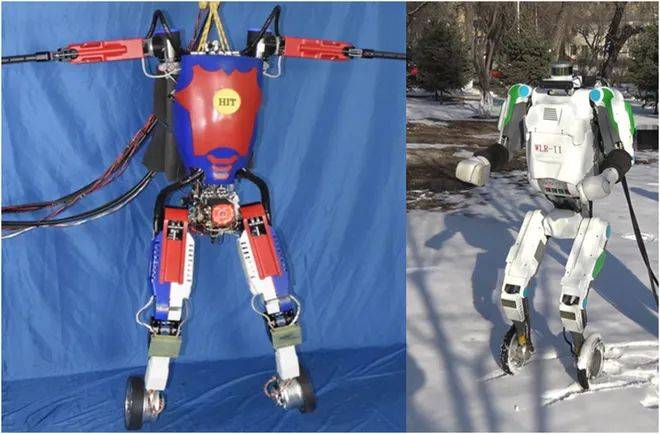
Two brothers are conducting joint movement and snow mobility tests
As shown in the picture above, the first two generations of robots have actually verified 's adaptability to complex terrain and maneuverability on the ground, but they are all powered by external pumping stations. This time WLR-3P has made substantial improvements based on the design of the first two generations of wheel-legged robots. Not only improves athletic ability, but also achieves power autonomy.
Next, the team also needs to consider how to match the output power of the HPU and the power required by the HDU. Regarding the requirements for driving power and robot movement, engineering issues such as heat dissipation and noise need to be considered. More importantly, miniaturization and customization of hydraulic components are also one of the future research directions.
I have to say that the efficiency is too high. Then stop talking nonsense and wait for the fourth brother WLR.
The above is the detailed content of This wheel-legged robot from Harbin Institute of Technology has released version 3.0! Demystifying its design, controls and performance testing. For more information, please follow other related articles on the PHP Chinese website!

Hot AI Tools

Undresser.AI Undress
AI-powered app for creating realistic nude photos

AI Clothes Remover
Online AI tool for removing clothes from photos.

Undress AI Tool
Undress images for free

Clothoff.io
AI clothes remover

Video Face Swap
Swap faces in any video effortlessly with our completely free AI face swap tool!

Hot Article

Hot Tools

Notepad++7.3.1
Easy-to-use and free code editor

SublimeText3 Chinese version
Chinese version, very easy to use

Zend Studio 13.0.1
Powerful PHP integrated development environment

Dreamweaver CS6
Visual web development tools

SublimeText3 Mac version
God-level code editing software (SublimeText3)

Hot Topics
 Xiaohongshu begins testing AI chatbot 'Da Vinci'
Jan 15, 2024 pm 12:42 PM
Xiaohongshu begins testing AI chatbot 'Da Vinci'
Jan 15, 2024 pm 12:42 PM
Xiaohongshu is working to enrich its products by adding more artificial intelligence features. According to domestic media reports, Xiaohongshu is internally testing an AI application called "Davinci" in its main app. It is reported that the application can provide users with AI chat services such as intelligent question and answer, including travel guides, food guides, geographical and cultural knowledge, life skills, personal growth and psychological construction, etc. According to reports, "Davinci" uses the LLAMA model under Meta A product for training, the product has been tested since September this year. There are rumors that Xiaohongshu was also conducting an internal test of a group AI conversation function. Under this function, users can create or introduce AI characters in group chats, and have conversations and interactions with them. Image source: T
 Why is the network connection in win11 blank?
Jan 11, 2024 pm 06:21 PM
Why is the network connection in win11 blank?
Jan 11, 2024 pm 06:21 PM
While trying to modify the network connection method, some users accidentally discovered that the network adapter opened during the switching process was empty, causing them to be unable to successfully complete the switching operation. Faced with such a dilemma, how should we solve this problem? What's going on with the blank network connection in win11? 1. Driver problem. The network adapter driver equipped on the computer is incompatible with the current environment or version or even appears to be too old. Solution: Upgrade or reinstall the corresponding network adapter driver. 2. Hardware problem: The network adapter hardware has physical damage or even complete failure. Solution: Replace the original network adapter hardware. 3. System setting problem. Solution to Win11 system setting error on the computer: We can
 Solve the 'error: expected primary-expression before ')' token' problem in C++ code
Aug 27, 2023 pm 12:28 PM
Solve the 'error: expected primary-expression before ')' token' problem in C++ code
Aug 27, 2023 pm 12:28 PM
Solve the "error:expectedprimary-expressionbefore')'token" problem in C++ code. In C++ programming, we sometimes encounter some error prompts, such as "expectedprimary-expressionbefore')'token". This error is usually caused by incorrect syntax or expressions used in the code, causing the compiler to fail to understand the meaning of the code. This article will
 How to turn off Lenovo Win10 Firewall. Introduction to how to turn off Lenovo Win10 Firewall.
Jul 13, 2023 pm 01:33 PM
How to turn off Lenovo Win10 Firewall. Introduction to how to turn off Lenovo Win10 Firewall.
Jul 13, 2023 pm 01:33 PM
How to turn off Lenovo Win10 firewall? Firewalls can provide users with a better and safer computer network experience. Recently, some users asked how to turn off the firewall on Lenovo Win10 computers. In fact, the method is very simple. Let’s take a look at the operation method with the editor! Introduction to how to turn off the Lenovo Win10 firewall 1. Click Settings, enter "Control Panel", and open the "Control Panel". 2. Find "Windows Firewall". 3. Click "Turn Windows Defender Firewall on or off". 4. Select Close and confirm.
 C++ multi-tasking and scheduling function implementation skills in embedded system development
Aug 27, 2023 pm 03:42 PM
C++ multi-tasking and scheduling function implementation skills in embedded system development
Aug 27, 2023 pm 03:42 PM
C++ multi-tasking and scheduling function implementation skills in embedded system development Embedded systems refer to computer systems that are embedded in other devices and serve as specific functions. These systems usually need to handle multiple tasks simultaneously and perform flexible scheduling of tasks. In embedded system development, C++ is a widely used programming language that provides many powerful features to meet the needs of multitasking and scheduling. This article will introduce some techniques of C++ to implement multi-tasking and scheduling in embedded systems, and explain it through code examples.
 How to clean up win7 system when computer C drive is full
Jul 09, 2023 pm 04:05 PM
How to clean up win7 system when computer C drive is full
Jul 09, 2023 pm 04:05 PM
After running the win7 system for a period of time, I found that the C drive space is getting smaller and smaller. The size of the C drive space is related to the speed of the system. What should some users do when they encounter the situation where the win7 system’s C drive is suddenly full? Let me teach you how to clean the C drive on Windows 7 computer. 1. Right-click on the C drive - Properties, the following screen will appear, click Disk Cleanup. 2. When the following screen appears, check everything, click OK, and clean directly. 3. Right-click on the computer - Properties - System Protection, click Configure, and then select Delete. 4. Switch the tab to Advanced and click Settings. 5. Set virtual memory and click Change. 6. Uncheck Automatically manage paging file sizes for all drives, then select drive C, select No paging file, and set the virtual memory setting to
 Where to open Windows 7 Control Panel Detailed introduction to the opening parts of Windows 7 Control Panel
Jul 09, 2023 pm 12:45 PM
Where to open Windows 7 Control Panel Detailed introduction to the opening parts of Windows 7 Control Panel
Jul 09, 2023 pm 12:45 PM
Many users don't know where to open the Windows 7 control panel. In fact, it is very simple to open the control panel of the Windows 7 computer. First, we right-click the mouse to open the computer's properties page. On the page, you can see the control panel and click to open it. That's it. Open the Windows 7 control panel and you can make a series of settings to make computer operation more comfortable and convenient. Detailed introduction to the opening part of Windows 7 control panel 1. Right-click the computer desktop icon 2. Click [Properties] 3. Click [Control Panel] in the directory where the computer properties belong 4. You can open the control panel setting page
 JavaScript function template engine: a powerful tool for dynamically generating HTML
Nov 18, 2023 pm 12:41 PM
JavaScript function template engine: a powerful tool for dynamically generating HTML
Nov 18, 2023 pm 12:41 PM
JavaScript function template engine: a powerful tool for dynamically generating HTML. In front-end development, dynamically generating HTML is a common requirement, for example: displaying search results based on information entered by the user, dynamically rendering pages based on data incoming from the background, etc. In traditional front-end development, we usually use string concatenation to generate dynamic HTML code. However, this method has many limitations, such as poor readability, error-prone, and difficult maintenance. The JavaScript function template engine can be very good





